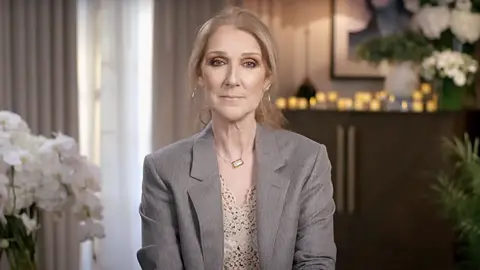 EBU
EBUCéline Dion made a rare appearance during the first semi-final of the Eurovision Song Contest with a brief, pre-recorded message.
The star won the contest for Switzerland in 1988, and it had been rumoured she would take the stage as the ceremony returns to the country this year.
“I’d love nothing more than to be with you,” she said in a video, apparently ruling out that possibility. “Switzerland will forever hold a special place in my heart. It’s the country that believed in me and gave me the chance to be part of something so extraordinary.”
The semi-final saw 10 acts qualify for Saturday’s grand finale, including Swedish entrants KAJ, whose song Bara Bada Bastu is the runaway favourite.
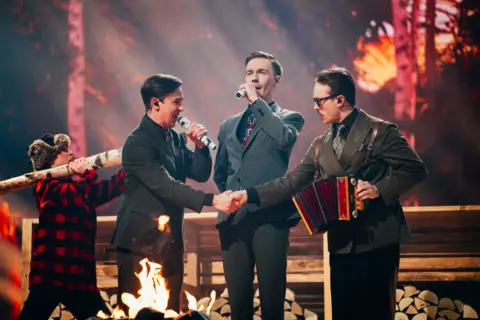 Sarah Louise Bennett
Sarah Louise BennettTheir song, an accordion-led comedy number whose title translates to “let’s take a sauna”, has a 40% chance of winning, according to bookmakers.
If the prediction comes true, it would be Sweden’s eighth Eurovision title – making them the most victorious country in the contest’s history (they are currently tied with Ireland, on seven wins each).
Fifteen acts performed at Tuesday’s semi-final in Basel’s St Jakobshalle. These are the ones who made the cut.
- Norway: Kyle Alessandro – Lighter
- Albania: Shkodra Elektronike – Zjerm
- Sweden: KAJ – Bara Bada Bastu
- Iceland: VÆB – RÓA
- Netherlands: Claude – C’est La Vie
- Poland: Justyna Steczkowska – GAJA
- San Marino: Gabry Ponte – Tutta L’Italia
- Estonia: Tommy Cash – Espresso Macchiato
- Portugal: NAPA – Deslocado
- Ukraine: Ziferblat – Bird of Pray
That means that the Eurovision dreams of Azerbaijan, Belgium, Cyprus, Croatia and Slovenia have all ended for 2025.
Of those, the biggest surprise was Belgium’s Red Sebastian, whose rave anthem Strobe Lights had been predicted to finish among the top five.
His disqualification came on the day of his 26th birthday.
Ten more acts will progress to the main competition after Thursday’s second semi-final.
The “Big Five” countries, who contribute the most financially to the competition (France, Germany, Spain, the UK and Italy) qualify automatically, as do last year’s winners, Switzerland.
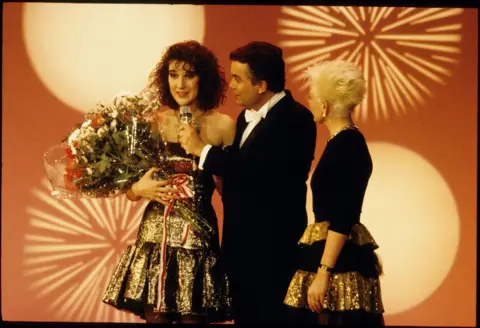 Getty Images
Getty ImagesDion’s video message came during the ceremony’s interval, as votes were being cast.
Although she was unable to be there in person, it was a coup for organisers. The singer has stepped away from the limelight in recent years due to health issues related to stiff-person syndrome (SPS), a neurological condition that causes muscle spasms and makes it difficult for her to walk.
After a four-year break, she made an emotional comeback at last summer’s Paris Olympics, singing Edith Piaf’s classic Hymne à l’Amour from the Eiffel Tower.
Speculation over a potential Eurovision appearance has been mounting since Swiss singer Nemo won the 2024 contest.
In her video, Dion said it was “beautiful and emotional” to see the young singer lift the trophy, and recalled that her victory in 1988 “was a life-changing moment for me”.
“To the people of Switzerland, thank you for your love,” she continued. “This night is yours and I hope you feel as proud as I do.”
After repeating her message in French, several former Eurovision contestants appeared on stage to cover Dion’s winning song from 1988, Ne Partez Pas Sans Moi (Don’t Leave Without Me).
However, organisers said they had not given up hope of the star appearing at the final this weekend.
“We are still in close contact with her,” they said in a statement.
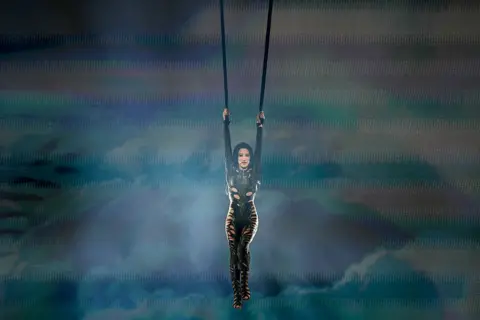 Getty Images
Getty ImagesTuesday’s semi-final opened with Icelandic group VÆB, two brothers with the unregulated energy of former Irish entrants Jedward.
They were followed by Polish star Justyna Steczkowska, who hung precariously above the stage on two ropes, as she sang her witchy hymn to mother earth, Gaja.
The acrobatics continued with Slovenian musician Klemen, who was suspended upside down during his ballad How Much Time Do We Have Left?
The song was a tribute to his wife, who has recently recovered from cancer, but the emotional performance wasn’t enough to clinch him a position in the final.
Taking a lighter note was Estonia’s Tommy Cash, whose quirky anthem Espresso Macchiato was interrupted by a “stage invader” – actually a dancer who replicated his noodle-limbed dance moves.
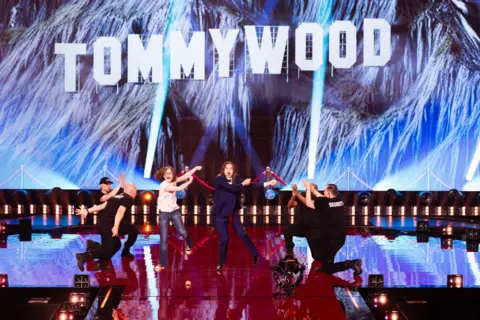 Corinne Cumming
Corinne CummingThe arena was awash with Ukranian flags for Ziferblat, whose prog-pop anthem Bird Of Pray is a message of hope and resilience to families separated by the country’s ongoing war with Russia.
Italy’s Lucio Corsi brought 70s glam rock vibes with his track Volevo Esse Un Duro, which even featured a visual call-back to David Bowie and Mick Ronson’s iconic 1972 performance of Starman on Top Of The Pops.
Bosnian singer Marko Bošnjak was all black eyeliner and sinister energy for his kill-your-enemies anthem Poison Cake, while Dutch singer Claude took the opposite approach, brimming with positivity throughout his upbeat performance of C’est La Vie.
And Swiss singer Zoë Më was bathed in a sea of mobile phone lights as she performed Voyage , an understated and rather beautiful plea for kindness and understanding.
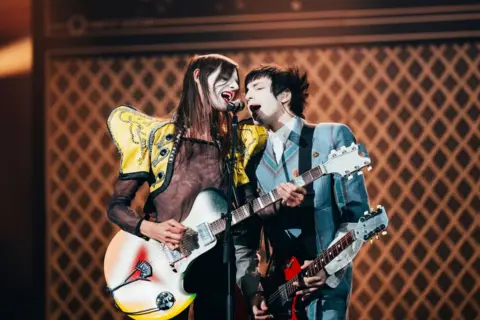 Sarah Louise Bennett
Sarah Louise BennettHowever, KAJ were the artists to beat – with the entire audience stomping along to their goofy sauna anthem (“Damn it, turn up the heat!”)
The song, performed in the Vörå dialect, is a radical departure from Sweden’s tried and tested formula of slick pop anthems.
It was the surprise winner at the Melodifestivalen, the hotly-contested show that selects the country’s Eurovision entry, and has gone on to top the Swedish pop charts for 11 weeks.
Speaking to the BBC, the band – who are actually from the Swedish-speaking part of Finland – said it was strange to enter the contest as the presumed favourite.
“We are feeling the pressure a bit,” they admitted, “but we’re gonna go out there, have fun, bring the steam, bring the sauna culture, and we’ll see how far it goes.”

